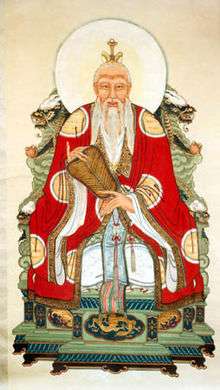Definify.com
Definition 2025
老子
老子
Chinese
old (of people); aged; venerable (person); outdated; experienced; (a prefix used before the surname of a person or a numeral indicating the order of birth of the children in a family or to indicate affection or familiarity)
|
child; son; (noun suff.); small thing; midnight; 11 p.m.-1 a.m.; seed; egg; 1st earthly branch
|
||
|---|---|---|---|
|
simp. and trad. (老子) |
老 | 子 | |

老子
Proper noun
老子
- Laozi, a Chinese philosopher, and founder of Taoism who lived between 604 BCE and 531 BCE
- Laozi (also called Tao Te Ching, a book of philosophy supposedly written by Laozi)
Pronunciation 2
Pronoun
老子
Usage notes
When 老子 is used this way, it often gives off an arrogant, angry, childish or humorous tone.
Noun
老子
- old man
- (slang) father; old man
- (dated or regional) son; young man (i.e. a mother scolding her son)
- 最奇怪的是昨天街上的那個女人,打他兒子,嘴裏說道:「老子呀!我要咬你幾口纔出氣!」他眼睛卻看着我。 [MSC, trad.]
- 最奇怪的是昨天街上的那个女人,打他儿子,嘴里说道:“老子呀!我要咬你几口才出气!”他眼睛却看着我。 [MSC, simp.]
- From: 1918, Lu Xun, A Madman's Diary
- Zuì qíguài de shì zuótiān jiē shàng de nàge nǚrén, dǎ tā érzǐ, zuǐ lǐ shuōdào: "Lǎozi ya! Wǒ yào yǎo nǐ jǐ kǒu shān chūqì!" tā yǎnjīng què kàn zhe wǒ. [Pinyin]
- The strangest was a woman on the street yesterday. She was hitting her son. From her mouth, I heard her say, "Young man! I'd like to take a few bites out of you just to vent my anger!" Yet, her eyes were fixed on me.
Japanese
Etymology 1
| Kanji in this term | |
|---|---|
| 老 | 子 |
|
おい Grade: 4 |
こ > ご Grade: 1 |
| kun'yomi | |
Compound of 老い (oi, “stem of verb oiru, to become old”) + 子 (ko, “child”). The ko changes to go due to rendaku (連濁).
Pronunciation
Noun
老子 (hiragana おいご, romaji oigo)
Synonyms
- 年寄り子 (としよりこ, toshiyoriko)
Etymology 2
| Kanji in this term | |
|---|---|
| 老 | 子 |
|
ろう Grade: 4 |
し Grade: 1 |
| on'yomi | |
From Middle Chinese.
Pronunciation
Proper noun
老子 (hiragana ろうし, romaji Rōshi, historical hiragana らうし)
- Laozi, a philosopher of ancient China
- the Tao Te Ching, a book of philosophy supposedly written by Laozi
External links
-
 老子 on the Japanese Wikipedia.Wikipedia ja
老子 on the Japanese Wikipedia.Wikipedia ja
-
 Laozi on Wikipedia.Wikipedia
Laozi on Wikipedia.Wikipedia
-
 老子道徳経 on the Japanese Wikipedia.Wikipedia ja
老子道徳経 on the Japanese Wikipedia.Wikipedia ja
-
 Tao Te Ching on Wikipedia.Wikipedia
Tao Te Ching on Wikipedia.Wikipedia
Etymology 3
From the English pronunciation of Lao-Tsu, from Chinese 老子 (Lǎozi).
Pronunciation
- IPA(key): [ɺ̠äo̞t͡sɯᵝː]
Proper noun
老子 (katakana ラオツー, romaji Raotsū)
- Laozi, a philosopher of ancient China